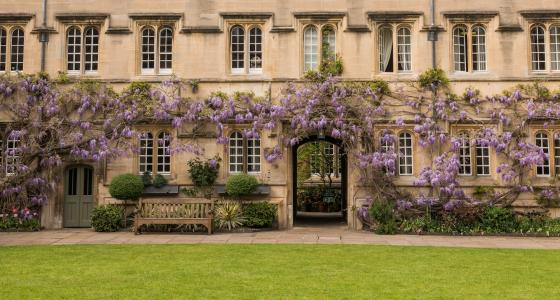Speaker: Mark Davies
He began by telling us about the earliest references to Welsh history contained in the “Mabinogion”, which he described as a kind of Canterbury Tales based on old Welsh folk stories. He described two books:
“The Red Book of Hergest” a copy of which was in the Library of Jesus College but is now in the Bodleian. This tells the story of Lludd and Llefelys, two brothers. Lludd, the elder brother, inherited the kingship of Britain and founded the city of Caer Lludd (London). Llefelys married a princess from France, and became King there.
“The White Book of Rhydderch” included the earliest text of the Mabinogion which included the subsequent story of Lludd. His country was subject to three scourges: 1. An invasion by the Coraniaid, who were able to hear everything people said or did; 2. Every May Day, there was a terrible scream, leading women to miscarry; and 3. There was Famine and lack of grain.
Lludd went to France to ask his brother’s advice. His brother told him, for plague no. 1 – to gather a poisonous mixture made from an insect which was harmless to Britons, then to invite the Coraniad to a feast and spray them with this mixture; For plague no. 2 the screaming was believed to be caused by two dragons (red & white) fighting. So he was advised to set a trap in Oxford (the geographical centre of the country), to put the dragons to sleep with a barrel of mead, and take the sleeping dragons to Snowdonia and bury them; For plague no. 3, which was caused by a mighty magician (Merlin?) putting everyone to sleep by magic and stealing the food, Lludd must confront him and keep awake with a vat of cold water. These terrible plagues seem to have ended, so the advice must have been good.
Another source of early history was the “History of the Kings of Britain” written in 1139 by Geoffrey of Monmouth. This described the conflict between the Celts and the Saxons, and the retreat of the Celts into Wales and the West under Vortigern. The Battle of Dyrham was fought between the Celts and the West Saxons. The battle was won by the Saxons and this defeat led to the separation between the Welsh and the Cornish Celts.
Jesus College, Oxford was founded in 1571 during the reign of Queen Elizabeth 1, although the Founder was a Welshman, Hugh Price who was Treasurer of St David’s Cathedral in Pembrokeshire. It is the only Elizabethan college in Oxford. For many years Welsh men and boys constituted the majority of students, and they came from both rich and poor homes. They tended to stand out due partly to their preference for beer rather than wine, and their relative poverty, strength and physicality. This led to their becoming the butt of various student jokes and nicknames, for instance the popular cheap meal of cheese on toast became known as Welsh Rarebit. A well-known story, probably apocryphal, concerned two famous 18th century figures – Richard “Beau” Nash (a Welshman from Swansea and a student in Jesus) and John Wesley (future founder of Methodism). They are said to have met on a narrow pavement, and one refused to give way, saying to the other “I never make way for a fool”, to which the other replied “I always do”, and stood aside (we suspect we know which of the two said what).
The famous and centuries-old Town and Gown riots, that often started around Carfax at the top of the High Street, figured largely in the history of Jesus College. The Welsh students, known for their physicality, were often pitted against the Bargemen from the canal nearby. The Jesus oarsmen have also performed very well in the annual ‘Bumps’ rowing contests among colleges.
Jesus College also figured in the life and thoughts of T E Lawrence, who was born in Caernarvonshire and studied at Jesus and who gained a first class degree in History. In his first year in Oxford he was the first to navigate an underground stream that had been covered over in Medieval times and ran through the middle of Oxford.
Other famous names with Welsh connections in Oxford include J R R Tolkien, who was extremely interested in the Welsh language, and Dylan Thomas who met and took advantage of the historian A J P Taylor. Taylor wrote “I disliked Dylan Thomas more than anyone I have known, and have no desire to preserve his memory.

